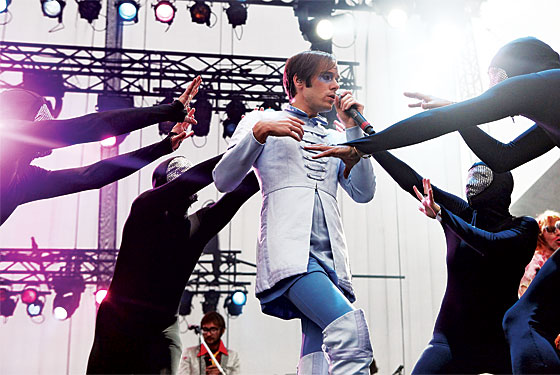
Kevin Barnes—the man behind the wildly experimental pop band Of Montreal—has ridden a giant white stallion in not much more than electric-blue mascara. He’s committed mock suicide by hanging himself, emerged from a coffin covered in shaving cream, and, during a New York show this year, contorted himself into a human chair for avowed Of Montreal fan Susan Sarandon, who then spanked the tour manager (dressed as a pig) with a ruler. He is not one for understatement, and neither are his fans. “Kevin is one of the bravest musicians of my generation,” says Solange Knowles, the indie-leaning younger sister of Beyoncé. “I grew up watching Tina Turner, James Brown, Michael Jackson, people who were performers, not just singers. For some reason the performance style that’s cool right now is not trying too hard. But to me, if you’re going to do anything, why not try hard? It takes vulnerability and bravery, but Kevin has no fear. I mean, there’s no way I’m getting on a horse naked!”
Thirteen years into his career, the onetime cult figure is now a legitimate pop star. Next month, he’ll release Of Montreal’s tenth album, False Priest, a bass-heavy, R&B-influenced opus featuring appearances by Janelle Monáe, who will open Of Montreal’s fall tour, and Knowles, who is also working with Barnes on her next album. “On paper, [the partnership] probably sounds a lot more unusual than it is,” says Knowles. “So much of his music is naturally soulful, though, and it always has been.”
But there’s another, decidedly more conventional Kevin Barnes: the 36-year-old father of a 5-year-old daughter, who watches ESPN, praises his wife’s cooking, and has friends over for gin-and-tonics in the backyard of his Athens, Georgia, home. “We have volleyball cocktail parties,” says Barnes, adjusting his knotted green-and-white ascot.
How Barnes came to neatly divide his personality in two is as engaging as a southern-Gothic short story, or at least a particularly good episode of Dr. Phil. It opens in the late eighties in Grosse Pointe Park, Michigan, where Barnes was growing up “an intellectual late bloomer” with “no exceptional interests or aptitudes” other than writing songs and playing guitar. He was the black sheep in a family of well-behaved Catholics. “I didn’t [care] about school, but I still craved my mom’s love,” he says. Unable to reconcile his inner rebel with his inner mama’s boy, Barnes got stoned. “One time I smoked way too much of this really powerful pot. It was laced with something crazy and it just burned my brain. I could feel it sizzling.” Upsetting as that was, it “was also good for me,” he says. “It taught me I can always step outside of myself so I don’t really get lost in that void.”
The void came in handy when the family moved to staid Palm Beach Gardens, Florida. His brain still smoldering, young Barnes disappeared into his music. When he wasn’t writing songs about his desperate lust for girls, he was fantasizing about being attracted to boys. “I was more feminine than the other straight guys, and I got picked on,” says Barnes, who speaks in a fey whisper, so this is easy to imagine. “I was like, if I’m going to get picked on, I might as well be gay. Then I would at least have a support group, and we could isolate ourselves and be in that world together.” Being gay also seemed more interesting. “I romanticize homosexuality. Most of the gay guys I met were smart and so many of the straight guys were dipshits, especially in South Florida. I wanted to be part of the more elegant caste.” But Barnes never found a serious boyfriend—making out has been the extent of his homosexuality, which is why he says he’s not gay. “I’ve never had a connection where I wanted to tear a guy’s clothes off. I’ve been open to it. Maybe I haven’t found the right guy.”
Directly after high school he hightailed it to Athens, the notoriously hip breeding ground for the B-52s, R.E.M., and Vic Chesnutt. He hooked up with the self-consciously mysterious Elephant 6, a collective of genre-bending underground musicians. Even then he was calling himself Of Montreal (for a failed romance with a Canadian woman). Beginning in 1997, using mainly Elephant 6 musicians, Barnes released three albums in rapid succession—all engagingly twee, critically praised, and commercially unsuccessful. By the end of 2004, he was married to Norwegian musician Nina Grøttland, “the only girl I’ve ever been with for more than a month,” and the father of Alabee.
Around the same time, Barnes split with his bandmates and started working on his own. Alone, he could finally unleash his super freak. The weirder and more decadent he got, the more his fans liked it. The next four Of Montreal albums, including 2004’s Satanic Panic in the Attic and 2005’s The Sunlandic Twins, became the best selling of his career (then and now, Barnes collaborates with a rotating cast of musicians). Promoters started booking his increasingly outrageous shows for festivals, and licensing firms were buying up his songs, sometimes to the chagrin of fans: “Wraith Pinned to the Mist and Other Games” ended up on an Outback Steakhouse commercial.

And this is where things get interesting. “Having a child made me depressed,” says Barnes. “I felt like I had to become responsible, but I didn’t want to become responsible. When you’re faced with a dilemma that has no resolution, it causes a split in your head, because you can’t do one without abandoning the other and you can’t abandon either.” He and Grøttland separated and he “went crazy for a couple of months,” taking anti-anxiety meds and “getting really really wasted,” to the point where “I would take off my clothes at parties and try to make out with, like, everyone.”
The end of Barnes’s marriage unleashed two things: His now-signature sound, a patchwork quilt of jittery psychedelia, straight-up pop, indie folk, and soul first heard on 2007’s Hissing Fauna, Are You the Destroyer?; and Georgie Fruit, an aging black, transsexual, ex-con soul singer who became Barnes’s stage alter-ego. “Georgie is a wizard,” he says. “He helped me cope when I was suffering. I like the idea of a person that goes back and forth between male and female experiences. He offers an escape from any perceived perceptions of self.”
Turns out performing in lamé hot pants was just the thing Barnes needed to be a family guy again. He and Grøttland reconciled. And in 2008, Of Montreal put out Skeletal Lamping, the sexed-up psychedelic funk album that led to Letterman, radio success, and high-profile slots at Lollapalooza and Bonnaroo. “On earlier records I wrote songs that were the opposite of what I was feeling,” says Barnes. “I was rebelling against douche-baggery, so I kept the testosterone out of the music by making something feminine and sexually removed. These songs are easier to sing because they’re in line with where I’m actually at. The music sort of fixed me.”
False Priest
Of Montreal.
Polyvinyl.
Sept. 14.